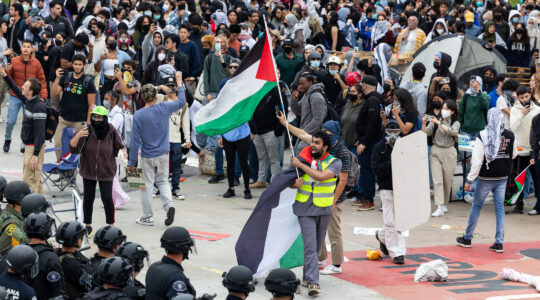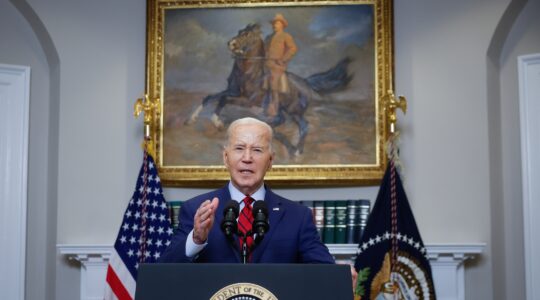WASHINGTON (JTA) — Israel’s war cabinet unanimously voted to approve an invasion of Rafah in southern Gaza, shortly after Hamas said it had agreed to a ceasefire deal with Israel.
The announcements were two landmarks in a whirlwind — and confusing — day of diplomacy and warfare following months of speculation and negotiations. As of Monday night Israel time, both the fighting and diplomacy were ongoing.
Israeli officials said the proposal Hamas accepted was different from the one Israel had agreed to. In its statement, the war cabinet said the outline was “far from the requisite demands” of Israel but that indirect talks would continue to try to reach an “acceptable” deal. The United States said it was examining the draft, which it did not detail, and reiterated its objection to an Israeli invasion of Rafah.
The offensive in Rafah appears to have begun. Earlier in the day, Israel told Palestinians in the eastern part of Rafah to evacuate, and footage from the area showed masses of people leaving on foot, along with video of Israeli airstrikes.
Israel’s government has said for months that it must invade Rafah in order to take out Hamas’ remaining battalions in the city. The war cabinet statement said the military operation “would apply military pressure on Hamas in order to advance the liberation of our hostages and the rest of the war’s goals.”
But the Biden administration and a range of other international voices have opposed the invasion because more than a million Palestinians have taken shelter in Rafah, which is on the border with Egypt. Matthew Miller, the State Department spokesman, said that Israel has not yet adequately described a practical means of evacuating civilians from Rafah.
“We made quite clear our opposition on Rafah for some time, which is that we cannot support an operation in Rafah as it is currently envisioned,” Miller said.
Miller was also the first Biden administration official to comment Monday afternoon on Hamas’ acceptance of a ceasefire outline.
“We are reviewing that response now and discussing it with our partners in the region,” Miller said. He added that CIA chief William Burns, who is shuttling in the region to reach a deal, was in consultation with his Israeli counterparts.
“We continue to believe that the hostage deal is in the best interests of the Israeli people,” Miller said. “It’s in the best interest of the Palestinian people, it would bring an immediate ceasefire, it would allow increased movement of humanitarian assistance and so we’re going to continue to work to try to reach one.”
In addition to pressure from the United States, Netanyahu is facing a push from families of the hostages and their supporters, who launched demonstrations around the country and have become a formidable political force.
“Hamas’ announcement must pave the way for the return of the 132 hostages held captive by Hamas for the past 7 months,” said a statement from the Hostages and Missing Families Forum. “Now is the time for all that are involved, to fulfill their commitment and turn this opportunity into a deal for the return of all the hostages.”
Israel’s military dropped leaflets over Rafah on Monday warning civilians to evacuate. “Anyone found near terrorist organizations endangers themselves and their family members,” the leaflets said.
Late Monday, after the war Cabinet vote, the Israel Defense Forces spokesman’s office said the IDF “is currently conducting targeted strikes against Hamas terror targets in eastern Rafah in the southern Gaza Strip.”
The proposal Hamas accepted was drafted by Egypt and Qatar, which are acting as mediators in the indirect talks, in consultation with the United States. The Hamas statement said that Ismail Haniyeh, one of the terror group’s political leaders, spoke with Qatari and Egyptian officials “and informed them of the Hamas movement’s approval of their proposal regarding the ceasefire agreement.”
Reports have said the proposal would pause fighting for six weeks, while exchanging at least 33 living Israeli hostages for hundreds of Palestinian security prisoners. It would also accelerate the entry of aid into Gaza, which world health officials have said is facing risk of a famine.
A key issue in the negotiations is whether the proposal will lead to a permanent ceasefire, which Hamas wants and Israel rejects. One of Israel’s stated war aims is to destroy Hamas, which launched the war on Oct. 7 when it killed approximately 1,200 people in Israel and took some 250 hostage. Israel launched counterstrikes on Oct. 8, and since then more than 34,000 Palestinians have been killed, according to Gaza officials. More than 260 Israeli soldiers have been killed in the invasion.






